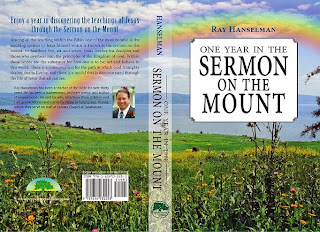Peter the
apostle used the example of Noah and the ark to demonstrate the
“long-suffering” nature of God to offer “salvation” to
mankind. In chapter three and verse twenty-one of his letter, Peter
shared how “Noah's ark” is a “pattern” of how people are to
be “saved by the resurrection of Jesus” through “baptism”
today where we read:
The like
figure whereunto even
baptism does also now save us (not the putting away of the filth of
the flesh, but the answer of a good conscience toward God,) by the
resurrection of Jesus Christ:
The
verse begins, “The like figure
whereunto even
baptism does also now save us...” Peter
began with the words, “The like
figure” or
“a thing formed after some pattern, resembles another or is its
counterpart” “whereunto”
which means “” “even baptism”
or “immersion or submersion which was commanded by Christ, by which
one after confessing his sins and professing his faith in Christ,
having been born again by the Holy Spirit unto a new life which
identifies publicly with the fellowship of Christ and the church”
“does also now”
which refers to “at this time, the present time and now” “save
us” or
“keep safe and sound, to rescue from
danger or destruction”.
Whereas the ark for Noah and his family, the symbol of “baptism”
declares our salvation through faith in Jesus Christ.
The
verse goes on to say, “(not the putting away of the filth
of the flesh, but the answer of a good conscience toward God,)”
Peter added a specific
explanation to this “baptism”
as he wrote parenthetically, “not the putting away”
or “putting off or laying aside” “of the filth”
which means “dirt and depravity” “of the flesh”
which refers to “the soft substance of the living body,
which covers the bones and is permeated with blood”,
“but” which means
“moreover, nevertheless and nonetheless” and is a disassociation
conjunction which means what is about to be written takes precedence
over what was previously stated “the answer”
or “craving and intense desire and seeking” “of a
good” which means “useful,
salutary, agreeable, joyful and happy” “conscience”
or “the soul as distinguishing between what is morally good and
bad, prompting to do the former and shun the latter, commending one,
condemning the other” “toward God”
which refers to “the Godhead bodily and trinity which is comprised
of God the Father, Christ the Son and the Holy Spirit”. The
“baptism” of which Peter wrote was not simply being immersed in
water but rather satisfying the desire for an inward establishing of
a relationship with God.
Finally
the verse says, “by the resurrection of Jesus Christ:”
Peter ended this verse with the
words, “by the resurrection”
which refers to “through the rising from the dead” “of
Jesus” whose name means
“Jehovah is Salvation” and is “the Son of God, the
Savior of mankind and God incarnate”
“Christ” or “the
anointed one and Messiah”. The only reason a person has access to
God Almighty is through “the resurrection of Jesus
Christ” His Son. This
“baptism” is the
only way people can be “right with God”.
When
we meditate upon Peter's words, we begin to understand the narrowness
and pointedness of “the baptism” which is “by”
Jesus' “resurrection”. There was only one ark upon which
man could be “saved” from the flood, and there is only one
“baptism” which can save people from their sins. May the
Lord Jesus through His Holy Spirit help us to understand how
exclusive is His salvation plan.
Next
time Peter shares how Jesus has “gone into heaven”,
so read ahead, and we shall join together then.
Until tomorrow…there is more…
Look for the daily devotional book “Equipped for Battle – From Generation to Generation”, the marriage book “So, You Want to Be Married”, and the new devotional “One Year in the Sermon on the Mount” in all major bookstore sites, http://www.amazon.com ; http://www.barnesandnobles.com ; download to e-books, and find it locally at www.mrzlc.com/bookstore.



